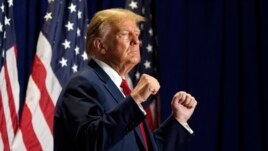04 March 2024
The United States Supreme Court ruled on Monday that former President Donald Trump can stay on 2024 presidential primary ballots.
All nine justices ruled that individual states cannot use the 14th Amendment to prevent presidential candidates from appearing on ballots. They said that power "rests with Congress and not the states."
The ruling ended efforts in several states, including Colorado, Maine and Illinois, to remove Trump from ballots for presidential primary elections run by state governments.

FILE - Republican presidential candidate former President Donald Trump gestures at a campaign rally, March 2, 2024, in Richmond, Va. The U.S. Supreme Court ruled that former President Donald Trump can stay on the 2024 presidential primary ballots. (AP Photo/Steve Helber, File)
Those state governments wanted to remove Trump, the leading candidate for the Republican Party nomination, from ballots because of his activities related to the 2020 presidential election. Trump is accused of trying to overturn his loss to Democrat Joe Biden. He is also accused of involvement in activities that led to the January 6 attack on the U.S. Capitol.
Colorado's highest state court decided that Trump incited the January 6 attack. It also ruled that Section 3 of the 14th Amendment, which was passed shortly after the American Civil War, could be applied to Trump. The amendment aimed to prevent former officeholders of the U.S. who "have engaged in insurrection" or "given aid or comfort" to such activity from holding such office again.
In Monday's ruling, the U.S. Supreme Court did not deal with the issue of insurrection. All nine justices agreed that Trump should be on the ballot. But they offered different opinions on the ruling.
A five-justice conservative majority wrote, "The Constitution makes Congress, rather than the states, responsible for enforcing Section 3 against federal officeholders and candidates."
Three liberal justices, Sonia Sotomayor, Elena Kagan, and Ketanji Brown Jackson, jointly wrote, "Today, the majority goes beyond the necessities of this case to limit how Section 3 can bar an oathbreaking insurrectionist from becoming President."
And Justice Amy Coney Barrett added that the majority should not have dealt with the "question whether federal legislation is the exclusive vehicle through which Section 3 can be enforced."
Trump posted on his social media network shortly after the decision was released: "BIG WIN FOR AMERICA!!!"
The case is the Supreme Court's latest direct involvement in a presidential election since Bush v. Gore. In that case, the court stopped the recount of votes in the state of Florida that effectively handed the 2000 election to Republican George W. Bush.
The Supreme Court has an even more important case ahead that involves Trump directly on the week of April 22.
A three-judge federal appeals court had ruled earlier that Trump could be put on trial for trying to undo the 2020 elections and actions leading to the January 6 attack. But the nation's highest court agreed last week to hear whether Trump could face criminal prosecution for actions taken while in office as president.
The decision effectively put on hold several federal cases against Trump and raised questions about whether Trump will be tried before the November election.
Recently, a jury in New York City found Trump guilty of defaming writer E. Jean Carroll. It ordered him to pay her $83 million. Last month, a New York judge presiding over Trump's civil fraud trial set a penalty and interest of $450 million and barred Trump from running a business in the state for three years. Later in March, Trump will face a trial for charges related to payments made to adult movie performer Stormy Daniels.
In addition to those ongoing cases, the former president is facing charges brought by the state of Georgia over his actions related to the 2020 presidential election. And the federal government has brought a case against Trump in the state of Florida for holding classified documents after leaving office.
I'm Anna Matteo.
Hai Do adapted this report for VOA Learning English from the Associated Press and other sources.
________________________________________________
Words in This Story
apply to –v. (phrasal) to able to use regarding someone
engage –v. to be involved in
insurrection –n. a violent act by a group of people aiming to overthrow and seize a government
defame –v. to say untrue things about someone in an effort to cause other people to have a bad opinion about the person in question
fraud –n. (legal) the act using dishonest methods to take something of value from a person or group